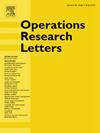风险概率标准下的有限视界部分可观测半马尔可夫决策过程
IF 0.9
4区 管理学
Q4 OPERATIONS RESEARCH & MANAGEMENT SCIENCE
引用次数: 0
摘要
本文研究的是有限视距部分可观测半马尔可夫决策过程的风险概率最小化问题,半马尔可夫决策过程是随机动态系统的最一般模型。与预期贴现和平均准则不同,本文研究的最优性是最小化累积奖励在有限终结阶段达不到规定利润水平的概率。首先,状态空间被扩展为当前未观测状态和剩余利润目标的联合条件分布。我们引入了一类取决于可观测历史的策略,以及一类包含联合条件分布的可观测过程的马尔可夫策略。然后,在温和的假设条件下,我们利用迭代技术证明价值函数是概率准则最优方程的唯一解。针对这个问题,我们确定了 (ϵ-)optimal Markov policy 的存在。最后,我们用一个带有概率准则的强盗问题来证明我们的主要成果,其中给出了半马尔可夫模型的有效算法和相应的数值计算。此外,对于还原到离散时间马尔可夫模型的情况,我们还得出了一个简明的解决方案。本文章由计算机程序翻译,如有差异,请以英文原文为准。
Finite horizon partially observable semi-Markov decision processes under risk probability criteria
This paper deals with a risk probability minimization problem for finite horizon partially observable semi-Markov decision processes, which are the fairly most general models for stochastic dynamic systems. In contrast to the expected discounted and average criteria, the optimality investigated in this paper is to minimize the probability that the accumulated rewards do not reach a prescribed profit level at the finite terminal stage. First, the state space is augmented as the joint conditional distribution of the current unobserved state and the remaining profit goal. We introduce a class of policies depending on observable histories and a class of Markov policies including observable process with the joint conditional distribution. Then under mild assumptions, we prove that the value function is the unique solution to the optimality equation for the probability criterion by using iteration techniques. The existence of (ϵ-)optimal Markov policy for this problem is established. Finally, we use a bandit problem with the probability criterion to demonstrate our main results in which an effective algorithm and the corresponding numerical calculation are given for the semi-Markov model. Moreover, for the case of reduction to the discrete-time Markov model, we derive a concise solution.
求助全文
通过发布文献求助,成功后即可免费获取论文全文。
去求助
来源期刊

Operations Research Letters
管理科学-运筹学与管理科学
CiteScore
2.10
自引率
9.10%
发文量
111
审稿时长
83 days
期刊介绍:
Operations Research Letters is committed to the rapid review and fast publication of short articles on all aspects of operations research and analytics. Apart from a limitation to eight journal pages, quality, originality, relevance and clarity are the only criteria for selecting the papers to be published. ORL covers the broad field of optimization, stochastic models and game theory. Specific areas of interest include networks, routing, location, queueing, scheduling, inventory, reliability, and financial engineering. We wish to explore interfaces with other fields such as life sciences and health care, artificial intelligence and machine learning, energy distribution, and computational social sciences and humanities. Our traditional strength is in methodology, including theory, modelling, algorithms and computational studies. We also welcome novel applications and concise literature reviews.
 求助内容:
求助内容: 应助结果提醒方式:
应助结果提醒方式:


